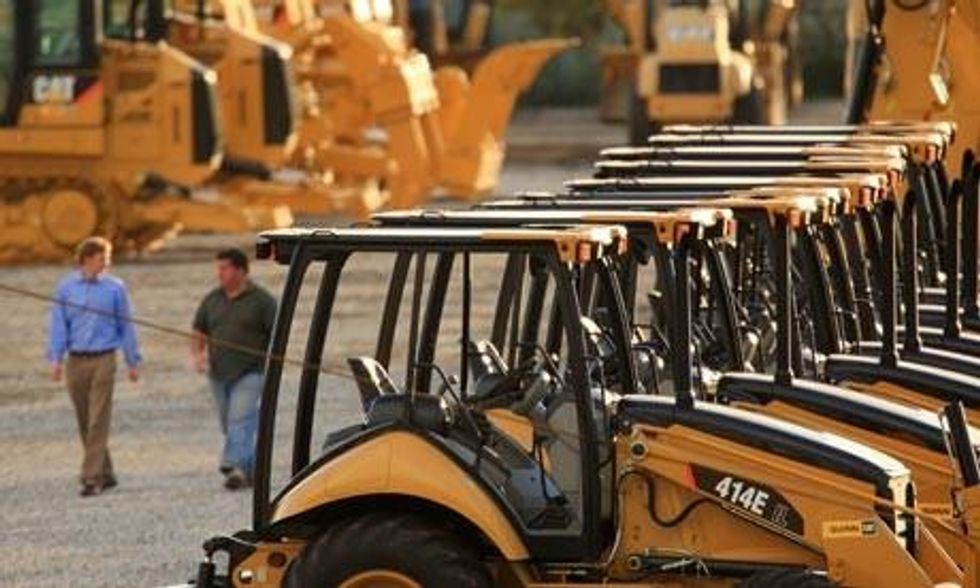"A rising tide lifts all boats," goes the old adage. It's a dubious promise: pay no attention to yawning income gaps, say the cruise ships to the dinghies, we're all getting paid. But the same ebbs and flows don't apply to everyone. Median family income has been declining for the first time since the Great Depression. According to economist Emmanuel Saez, 93% of all income gains since 2009 have gone to the top 1%. We're told we're three years into the post-recession era, but if you haven't noticed, it's not your fault.
Few places better illustrate the uneven recovery than Joliet, Illinois, where nearly 800 factory workers are locked in a bitter, three-months-and-counting strike against their employer. Caterpillar, famous maker of yellow bulldozers, has demanded its employees accept a six-year freeze on wages and pensions; the machinists' union says its members had no choice but to walk out.
Labour-management fights are nothing new, especially not for Caterpillar, which wears its union-busting credentials as a badge of honour. When car-workers resisted company plans to impose a two-tier wage system in 1992, Caterpillar crushed two strikes before they surrendered unconditionally. When workers at a London, Ontario locomotive factory refused a 50% wage cut last year, the company locked them out and then shut down the plant. "Few companies are as willing to take on unions, and uproot entire communities, as Caterpillar," says author Stephen Franklin, who covered the strikes for the Chicago Tribune.
What could really drive Caterpillar to demand its workers tighten their belts in a period of unprecedented prosperity? "Greed," might be the moralist response; "capital accumulation" the Marxist one. But a better explanation is even simpler: because they can.
What's surprising is how, in a still sluggish post-recession economy, Caterpillar is actually doing well. Incredibly well, in fact: last year's total sales, $60.1bn, broke all company records. Little of this comes from the US market, which counts for less than a third of Caterpillar's global sales. The company has been aggressively building its presence in Asia, and riding China's construction boom. Caterpillar's per-share profits soared 78% in 2011, from $4.2 to $7.4bn. Analysts predict profits will top $9bn by year end.
Labour costs, on the other hand, have declined. Caterpillar's most recent annual filing with the SEC shows the share of total operating costs represented by employee salaries and benefits shrank, from 24% to 21%, in the same period.
This explains the absence of the usual "we're broke" pronouncements from management, and the rather tortured pretexts for concessions in their place. "It's not solely about profitability," says Caterpillar spokesman Rusty Dunn, "but a need to be competitive in the industry."
Given Caterpillar's undisputed dominance of the construction equipment industry, it's unclear who it fears falling behind. The company says it wants cuts now to be better positioned for future downturns, although these rainy day scenarios are "intentionally vague," says Frank Larkin of the machinists' union, and "seem to apply to anything from an increase in raw material costs to Armageddon."
What could really drive Caterpillar to demand its workers tighten their belts in a period of unprecedented prosperity? "Greed," might be the moralist response; "capital accumulation" the Marxist one. But a better explanation is even simpler: because they can.
The political climate in the US today is such that it's open season on unions. The ongoing evisceration of public workers' collective bargaining rights, solidified with governor Scott Walker's triumph in Wisconsin's June recall election, set the trend, one that spilled over to other states and is now spilling over to private sector workers as well. That the justification for revoking those rights - state budget shortfalls - didn't hold up to evidence that many of the largest shortfalls were in non-union states, made no difference.
As with Caterpillar, it was never about labour costs, but opportunity. Public opinion has shifted. The rights to organise, and bargain collectively, have transformed from bedrock civil rights to vestigial luxuries; good salaries and pensions from objects of inspiration to resentment. All of this from the decades-old message drummed into us by politicians and businesses alike, that we are all on our own. Human agency consists of two choices: take it or leave it. To want more say in what you do for a living, for how much and under which conditions, and to want the same for others, is crazy.
Caterpillar understands this. Its corporate culture may be more predisposed than most to punishing uppity workers. But for it to do so without even the flimsiest appeal to economic necessity is truly a milestone. And in today's atomised America, it isn't just good business. It's good politics.


